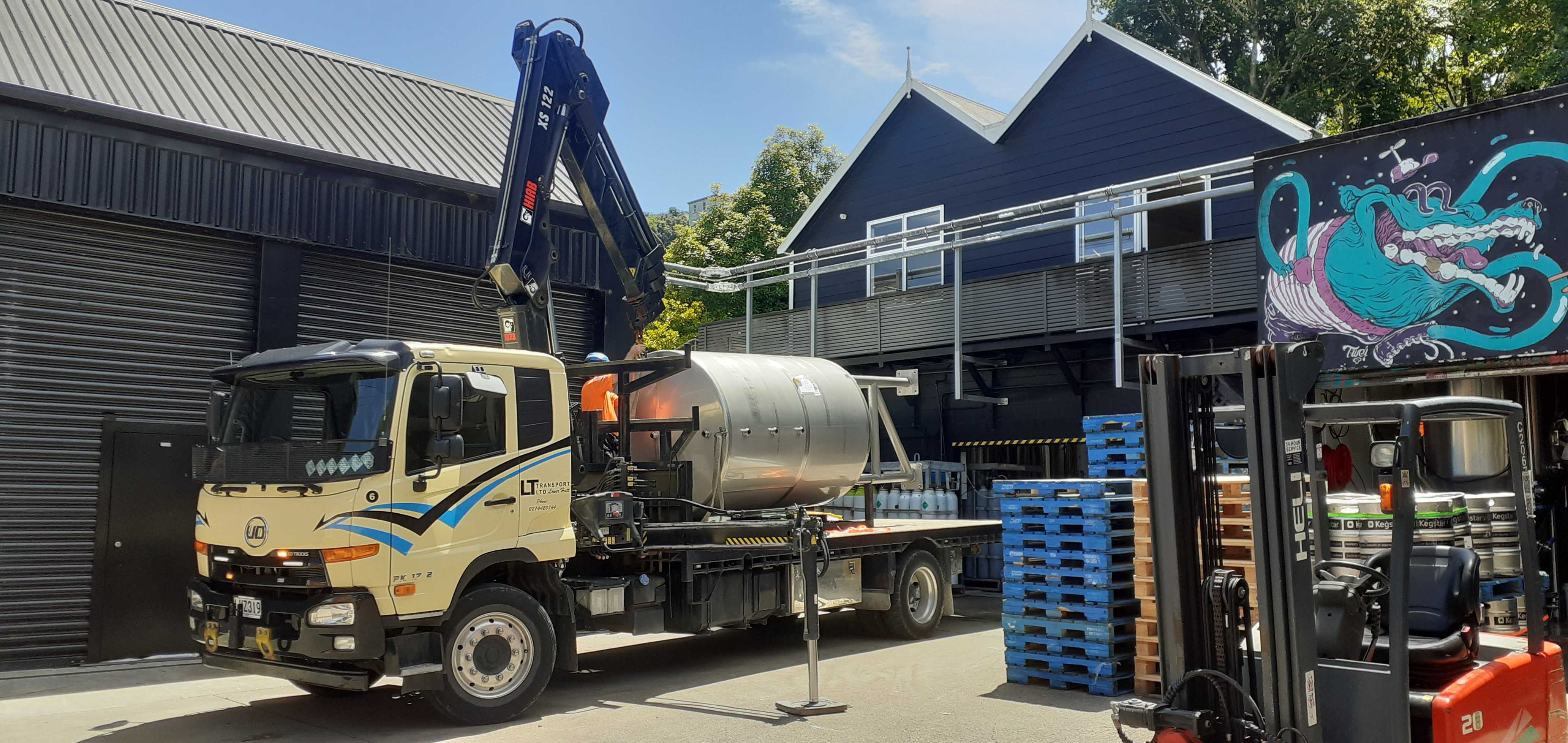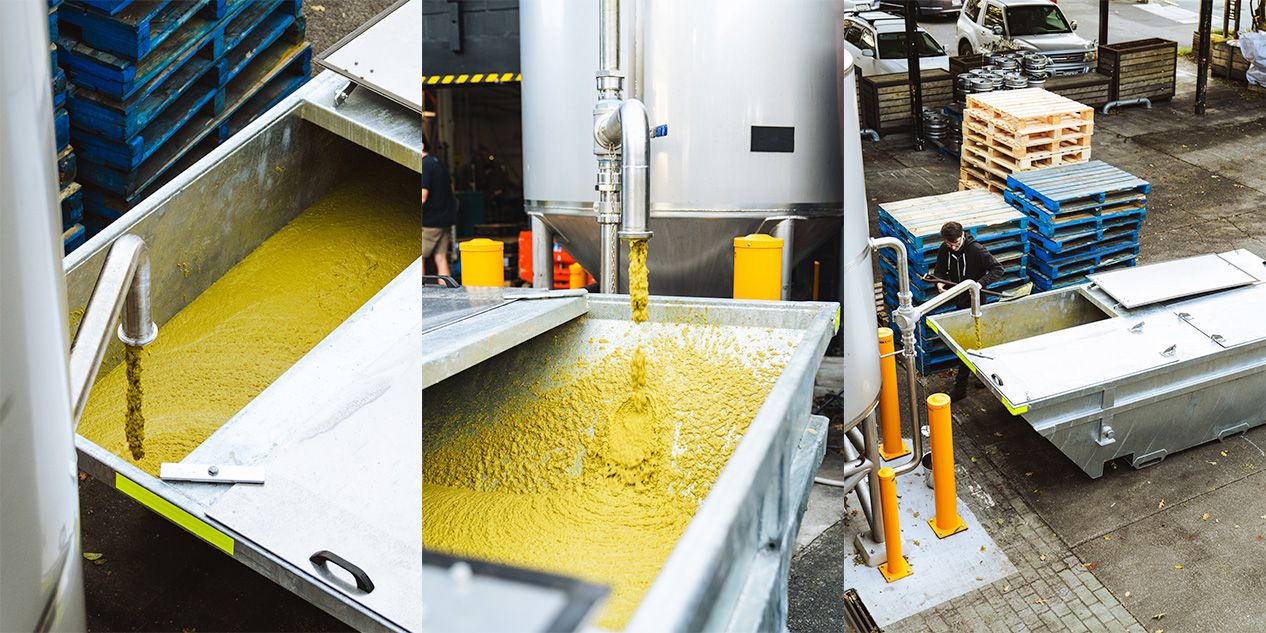
Update: November, 2025
We’re now 8 months into our new sludge-to-compost set-up, and it’s working an absolute treat.
Separating out the hop matter has slotted pretty seamlessly into our process, though it does come with one small downside: every month, when we empty the sludge tank into the transfer tank for its beautiful new life enriching soils, we can’t help but notice that the sludge smells incredible.
'Sludge' might not be the most endearing term for this thick, rich, vibrantly green hop purée, but it’s no wonder it smells so good - all that concentrated organic hop matter, exposed to air for the first time, bursting with citrus, passionfruit, pine resin, and stone fruit. Delicious.
Watching this incredible aroma be carted off every month got us thinking,"these hops still have more to give". We might be turning them into compost, but we’re still letting a lot of flavour go to waste. Some of our beers use such massive dry-hop loads that we suspect the liquid reaches a kind of aroma saturation point - it simply can’t absorb any more, leaving the hop matter at the bottom of the tank packed with unused goodness.
And so, the idea for Sludgefest was born - a beer that gives us another bite at the apple (the apple being hops, in this case) before their reincarnation as compost. The process is simple: hop matter from big, dry-hopped beers is decanted from the bottom of a tank of a just-finished beer directly into another containing a fresh beer base. It rests there for a few days before heading to its final destination, the sludge tank. It’s an easy, efficient way to squeeze a little more value from those humble hops.
For this batch of Sludgefest, we ran residual dry-hop from four different beers - most of them much larger tanks than the new base beer - through this second dry-hopping phase. The result is a beer absolutely loaded with hops across a hefty range of varieties: Nelson Sauvin, Simcoe, Equanot, Centennial, Citra, Amarillo, Motueka, Nectaron, and Mosaic.
Taste the results for yourself - try the Sludgefest beer.
Sludgefest: June 2025
Sludge. It’s not exactly super sexy, but what you do with it is important. Beer inevitably creates waste byproducts, and as brewers, we produce three main streams of organic waste; malt, hops & yeast.
Spent malt produced at our Aro Street brewery is repurposed as animal feed, with the solids dropped from our mash tun into plastic bins at the end of each brew, and collected by local Wellington pig & cattle farmers every week. In the past, we’ve also supplied spent grain directly to the Upcycled Grain Project for making crackers (I can vouch, they are delish!) and dog biscuits (can’t personally vouch for the flavour on those, but dogs seemed to love them).
Sludge however is a different beast. A slurry of leftover organic dry hop material and yeast matter, it’s higher in liquid content and removed later in the brewing process, and if left ‘unattended’ in the production cycle, it is bound for the drains.
For the longest time, we separated the remaining organic matter from our brews and housed it using two old, repurposed tanks. While this improvised design did significantly improve wastewater discharge, the output was unfortunately then trucked off as liquid waste, ultimately ending up at the landfill. Not great!
Enter the Sludge Tank. In 2024, Garage Project received funding support from the Wellington City Council Waste Minimisation Seed Fund - Organics Diversion Fund, which provided funding for small to medium sized projects aimed at diverting organic waste from entering local landfills. This fund was pooled from the $60 per tonne landfill levy collected by New Zealand’s Ministry for the Environment, with Wellington City Council receiving a population-based share, which must be used to support waste minimisation initiatives in line with the city’s Waste Management and Minimisation plan

Sludge holding tank installation at the Garage Project Aro Street Brewery
This funding allowed us to improve and expand on the improvised system, with the goal of increasing organic waste collection, and facilitating transfer of the waste to somewhere more sustainable than the landfill. During the initial phases of the project, we worked with EnviroNZ and Capital Compost, and determined the collected material could be used as compost as it was free of inorganic or chemical contaminants.
At the end of each ferment, the settled yeast and hop solids are diverted directly from each of our 15 fermenter tanks into one single sludge holding tank, via a pipe and pump system built into the brewery, designed by our own Steve Almond (GP’s in-house Sustainability and Projects Manager, aka ‘Black Ops’) in collaboration with EnviroNZ. The filled sludge tank is then emptied into a jazzy bespoke metal transfer tank, and transported out by EnviroNZ for composting, alongside general food waste collections and garden waste, by Capital Compost at the Wellington landfill site. All this compost is then converted into potting mix and vegie soil which is then made available to the public. Over the course of a year this will divert 60+ tonnes of organic matter for composting and away from the landfill, which in turn prevents the release of over five tonnes of CO2!

Sludge holding tank and transport bin on a collection day, feat. Garage Project Sustainability Manager, Steve
The set up not only benefits Garage Project - as the new EnviroNZ transfer tank now means that any brewery in the Wellington region (or in fact any business that produces organic waste) can side stream their sludge and send it for composting, rather than putting it down the drain or to landfill.
So there you go. Cool project, cool outcome. When you look at it like that maybe sludge is just a little bit sexy.
“
The Enviro NZ team is proud to team up with Garage Project on their sustainability journey by supporting the development of a specialised bin and partnering with Capital Compost to process the waste and managing the collection and transport.
We’re always looking for solutions to help customers achieve a low carbon circular economy and reduce waste going to landfill. The carbon and nitrogen rich waste is a key component of compost, which in a true circular sense, is then used to nurture the very soil where the likes of the hops Garage Project uses were grown.
This is a valuable use of organic waste that not only other breweries, but also other businesses who produce organic waste should get onboard with.
- EnviroNZ
”
If you’re a brewer (or someone else with a bulk organic food waste problem) interested in adopting, we’d love to share our learnings with you!
Trivia: Alongside Garage Project, 2024 funding was also granted to Kai Ika, a project repurposing fish heads, frames, and offal which were previously bound for waste, to feed those in need while reducing maritime environmental impact. Kai Ika kickstarted in Auckland in 2016 and expanded to Wellington in recent years via a satellite operation started up by one individual, Chris Jupp. Chris also runs the recycling collection service Cans for Kai which takes care of Garage Projects unusable cans.
